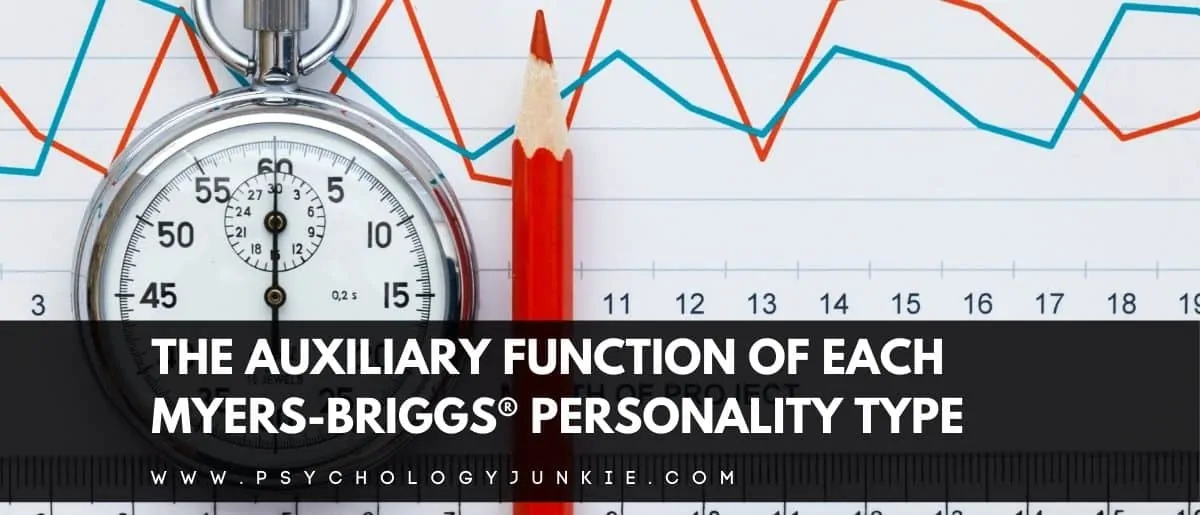The Auxiliary Function of Every Myers-Briggs® Personality Type
Last week we explored how each personality type experiences their dominant function. Today we’re going to explore the auxiliary function. The auxiliary function acts as a support to your dominant function. You can think of the dominant as the “commander in chief” of your personality and the auxiliary as the “second in command.”
Your auxiliary function provides balance for your dominant function. If you’re an introvert, your auxiliary function will be extraverted in nature. If you’re an extrovert, your auxiliary function will be introverted in nature. The reason for this is simple: Our psyches need balance. Introverts need to balance their subjective inner-world ideas with outer-world input. Extroverts need to balance their outer-world interactions and reactions with subjective analysis and reflection.

With that in mind, let’s jump right into exploring the auxiliary function of each personality type.
The Auxiliary Function of Every Personality Type
ENFPs and ESFPs – Introverted Feeling (Fi)
If you’re an ENFP or an ESFP, the auxiliary function (Introverted Feeling) helps center you on what is congruent with your values. This means you ask questions of yourself like:
“What is my gut telling me about this?”
“Is this right or wrong?”
“Am I being true to myself?”
“Is this person authentic?”
“Am I being authentic?”
“What really matters to me as an individual?”
Through Introverted Feeling, you stop yourself from being pulled in many different directions by the outside world. When you were younger, you probably didn’t have a good handle on Introverted Feeling. You might have left dozens of projects half-finished and you might have been more fixated on what was happening around you than what was happening in your heart. As you reached your teens, this function became more powerful. As an adult, this function is something you should rely on to inform every decision you make. Before chasing a new opportunity, you should analyze whether it lines up with your values, whether it matters in the long run, and whether you’re honoring your values and integrity. When you do this, you’re showing mature use of Introverted Feeling.
These quotes by Anne Frank (an ENFP) capture the perspective of auxiliary Introverted Feeling:
“How wonderful it is that nobody need wait a single moment before starting to improve the world.”
“People can tell you to keep your mouth shut, but that doesn’t stop you from having your own opinion.”
“Human greatness does not lie in wealth or power, but in character and goodness.”
ENTPs and ESTPs – Introverted Thinking (Ti)
If you’re an ENTP or an ESTP, the auxiliary function (Introverted Thinking) helps to ground your decisions in logic, precision, and accurate perspectives. This means you ask questions of yourself like:
“Is this really true?”
“Does this line up with the other principles at play here?”
“What are the leverage points in this situation/idea?”
“What do I really know about this?”
“Are there any inconsistencies here?”
“What category does this information belong in?”
Through Introverted Thinking, you stop yourself from becoming stuck in exploration mode without getting anything done. ENTPs are so fixated on exploring ideas and generating alternatives that they can become incapable of finishing what they start. ESTPs are so fixated on new experiences and activities that they can perpetually be chasing excitement to the detriment of their long-term goals. This is especially true in early life. As ETPs grow and mature they become more advanced with their use of Introverted Thinking. They allow themselves to pause, analyze, and weigh the logic of a decision before moving full-steam ahead forward. They finish more of their projects because they weigh the logic of switching gears before starting something else.
These quotes by John F Kennedy (ESTP) capture what auxiliary Introverted Thinking can look like:
“Too often we enjoy the comfort of opinion without the discomfort of thought.”
“The great enemy of the truth is very often not the lie, deliberate, contrived, and dishonest, but the myth, persistent, persuasive, and unrealistic.”
“Leadership and learning are indispensable to each other.”
ENFJs and ENTJs – Introverted Intuition (Ni)
If you’re an ENFJ or an ENTJ, the auxiliary function (Introverted Intuition) helps you notice underlying meanings, hidden patterns, and long-term implications. This means you ask yourself questions like:
“How will this play out in the long-run?”
“What else is going on here?”
“What am I not seeing?”
“Is there a deeper meaning to this?”
“What are my long-term goals and visions?”
“What are my hunches or instincts about this?”
“What’s the big picture?”
Through Introverted Intuition, you stop yourself from deciding on things too hastily. Younger ENxJs can become too quick to jump to conclusions or too hasty to make decisions or judgments. As you enter your teens, this function becomes more powerful and continues to develop and mature throughout your lifetime. Auxiliary Introverted Intuition helps you to see the deeper meaning behind everything in life. When you’re tapped into Intuition, you ask yourself if there are any perspectives you’re missing. You look at the long-term implications of your decision. You slow yourself down, quiet the world around you, and look inward to see if any insights reveal themselves.
These quotes by Carl Sagan (ENTJ) capture the Introverted Intuitive perspective well:
“The Earth is a very small stage in a vast cosmic arena. Think of the endless cruelties visited by the inhabitants of one corner of this pixel on the scarcely distinguishable inhabitants of some other corner, how frequent their misunderstandings, how eager they are to kill one another, how fervent their hatreds. Think of the rivers of blood spilled by all those generals and emperors so that, in glory and triumph, they could become the momentary masters of a fraction of a dot.”
“Every one of us is, in the cosmic perspective, precious. If a human disagrees with you, let him live. In a hundred billion galaxies, you will not find another.”
“If you wish to make an apple pie from scratch, you must first invent the universe.”
“Imagination will often carry us to worlds that never were, but without it we go nowhere.”
ESFJs and ESTJs – Auxiliary Introverted Sensation (Si)
If you’re an ESFJ or an ESTJ, your auxiliary function helps you to balance your decisions with facts, details, and personal experience. When you’re in touch with this side of your personality type, you ask yourself questions like:
“What’s the history of this situation?”
“What lines up with my experiences?”
“What can my past experiences teach me about this?”
“What proven facts can I rely on?”
“What are the details? Am I missing something?”
“What will provide stability and consistency?”
“Is this familiar?”
Through Introverted Sensation, you stop yourself from jumping to conclusions or being too hasty. The sensing side of your personality grounds you in your experiences, provides data from your past, and helps you to be consistent and measured. When you were a child, you probably had weakened capability here. You might have been too quick to form opinions or judgments. But as you reach your teens and beyond, this function continues to mature and develop. Your sensation side helps you to assess how your body is responding to situations, how familiar or secure something is, and whether there are any little details that might change how you see something. When you reflect on the past, analyze the history of a situation, or tune into your body you are using your auxiliary function.
These quotes by Michelle Obama (ESTJ) capture the auxiliary Introverted Sensing perspective:
“Everyone on earth…was carrying around an unseen history, and that alone deserved some tolerance.”
“It’s a sensation I’ve come to love as I’ve traveled more, the way a new place signals itself instantly and without pretense. The air has a different weight from what you’re used to; it carries smells you can’t quite identify, a faint whiff of wood smoke or diesel fuel, maybe, or the sweetness of something blooming in the trees. The same sun comes up, but looking slightly different from what you know.”
“It’s like, remember who you always were, where you came from, who your parents were, how they raised you. Because that authentic self is going to follow you all through life, so make sure that it’s solid so it’s something that you can hold on and be proud of for the rest of your life.”
INFJs and ISFJs – Auxiliary Extraverted Feeling (Fe)
If you’re an INFJ or an ISFJ, your auxiliary function helps you balance your perceptions with the needs and values of the world around you. When you’re in touch with this side of your personality type, you ask yourself questions like:
“How will this decision impact people?”
“What’s the polite/appropriate thing to do in this environment?”
“What are my values?”
“How are people feeling and how can I improve the morale?”
“Are there any unmet needs in this vicinity?”
“I feel my emotions bubbling up. Can I express them safely?”
Through Extraverted Feeling, you stop yourself from becoming so wrapped up in your inner subjective reflections that you lose touch with reality. Fe helps you to balance your perceptions with real-world data (body language, emotions, needs, values, customs, societal expectations). When you were a child, you probably had less capability in this area. You might have had lots of moments when you were lost in thought and missed noticing the feelings of the people around you. But as you entered your teen years and beyond, this function developed and continues to develop even now. Your Feeling side helps you to stay balanced, grounded, in touch with people, and in touch with your own ethics and values. Extraverted Feeling also gives you the desire to express your emotions outwardly in order to understand them.
These quotes by Leo Tolstoy (INFJ) demonstrate auxiliary Extraverted Feeling well:
“A quiet secluded life in the country, with the possibility of being useful to people to whom it is easy to do good, and who are not accustomed to have it done to them; then work which one hopes may be of some use; then rest, nature, books, music, love for one’s neighbor — such is my idea of happiness.”
“Nothing can make our life, or the lives of other people, more beautiful than perpetual kindness.”
“The striving of men’s souls towards unity, and the submissive behavior to one another that results therefrom, represents the highest … law of life.”
INTJs and ISTJs – Auxiliary Extraverted Thinking (Te)
If you’re an INTJ or an ISTJ, your auxiliary function helps you to balance your perspectives and reflections with action and decisiveness. When you’re in touch with this side of your personality type, you ask yourself questions like:
“How can I make this more efficient?”
“What is slowing us down?”
“What is the cause and effect of this action?”
“What are the pros and cons?”
“What’s the most logical perspective?”
“Am I being objective?”
Through Extraverted Thinking, you stop yourself from becoming overly wrapped up in a subjective headspace. Thinking keeps you grounded in logic and action so that your visions and goals can be achieved. In early life, you probably struggled to use this function as well as you do now. It usually becomes more mature in the teen years and continues to mature afterwards. In childhood you might have become so wrapped up in thoughts and reflections that you were slower to take action. Extraverted Thinking helps you to take action, organize your world for efficiency, and segment tasks in a logical way. When you’re in touch with your Thinking side you’re usually more productive, results-focused, and vocal about what needs to be done.
These quotes help to reveal the auxiliary Extraverted Thinking perspective:
“There are many talented people who haven’t fulfilled their dreams because they over thought it, or they were too cautious and were unwilling to make the leap of faith.” – James Cameron (INTJ)
“If you’re good at course correcting, being wrong may be less costly than you think. Whereas being slow is going to be expensive for sure.” – Jeff Bezos (ISTJ)
“You should focus relentlessly on something you’re good at doing, but before that you must think about whether it will be valuable in the future.” – Peter Thiel (ISTJ)
INFPs and INTPs – Auxiliary Extraverted Intuition (Ne)
If you’re an INFP or an INTP, your auxiliary function helps to balance your judgments with open-minded exploration and accumulation of new ideas and possibilities. When you’re in touch with this side of your personality type, you ask yourself questions like:
“Is there another way of looking at this?”
“What other possibilities are there?”
“Is there a connection I’m not seeing?”
“What new ideas does this generate in my mind?”
“What could I do with this?”
“Is there a new way to approach this?”
Through Extraverted intuition, you stop yourself from getting married to a judgment or principle prematurely. Ne helps you explore alternatives, generate new ideas, and see abstract connections. In early life, Ne is usually fairly immature, but as you reached your teen years and beyond this function matured and developed. In childhood, you might have formed opinions too quickly or had too narrow of a focus. As this function develops you become more balanced, open-minded, and creative. You’re more willing to take risks on new ventures and more willing to entertain a theory or idea that opposes your own ideas.
These quotes by Albert Einstein (INTP) help to capture the strength of auxiliary Extraverted Intuition:
“Imagination is more important than knowledge. Knowledge is limited: Imagination encircles the world.”
“The important thing is not to stop questioning. Curiosity has its own reason for existing.”
“Anyone who has never made a mistake has never tried anything new.”
“Logic will get you from A to Z; imagination will get you everywhere.”
ISFPs and ISTPS – Auxiliary Extraverted Sensation (Se)
If you’re an ISFP or an ISTP, your auxiliary function helps you to balance your judgments and opinions with real-world data and experience. When you’re in touch with this side of your personality type, you ask yourself questions like:
“What are the facts?”
“What is observable and objective?”
“What experience can be had here?”
“What resources are at my disposal?”
“How can I take action with what I have right now?”
“What is happening in my surroundings?”
“What’s relevant now?”
Extraverted Sensation is a perceiving process that focuses on absorbing data from the world as it exists in the moment. Because of this, you are detail-oriented and attentive. Unlike many types, you have a gift at reacting quickly to sudden changes and incoming information. You try to be realistic, aware, action-oriented, and practical. You like immersing yourself in the natural world around you and getting your hands on things and using them. You might have a creative streak, finding ways to craft or build things in new ways. In early life, you had wavering proficiency with your Sensing side. Your judgments were probably more quickly formed or subjective. However, in adolescence and beyond this function matures and develops, adding more weight, practicality, and balance to your judgments.
These quotes help to give us a glimpse of auxiliary Extraverted Sensation:
“If you spend too much time thinking about a thing, you’ll never get it done. Make at least one definite move daily toward your goal.” – Bruce Lee, ISTP
“If you want to learn to swim jump into the water. On dry land no frame of mind is ever going to help you.” – Bruce Lee, ISTP
“The present moment is filled with joy and happiness. If you are attentive, you will see it.” – Thich Nhat Hanh, ISFP
“Around us, life bursts with miracles–a glass of water, a ray of sunshine, a leaf, a caterpillar, a flower, laughter, raindrops. If you live in awareness, it is easy to see miracles everywhere. Each human being is a multiplicity of miracles. Eyes that see thousands of colors, shapes, and forms; ears that hear a bee flying or a thunderclap; a brain that ponders a speck of dust as easily as the entire cosmos; a heart that beats in rhythm with the heartbeat of all beings. When we are tired and feel discouraged by life’s daily struggles, we may not notice these miracles, but they are always there.” – Thich Nhat Hanh, ISFP
What Are Your Thoughts?
Do you have any insights or experiences to share? Share your perspectives with other readers in the comments!
Find out more about your personality type in our eBooks, Discovering You: Unlocking the Power of Personality Type, The INFJ – Understanding the Mystic, The INFP – Understanding the Dreamer, and The INTJ – Understanding the Strategist. You can also connect with me via Facebook, Instagram, or Twitter!
Subscribe to Our Newsletter

Want to discover more about personality type? Get the inside scoop with Susan Storm on all things typological, along with special subscriber freebies, and discounts on new eBooks and courses! Join our newsletter today!















Amazing!